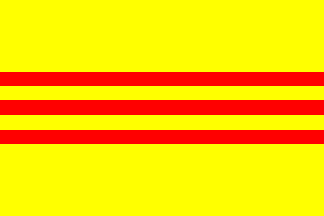

Throughout 1946 Ho Chi Minh negotiated with the French for independence, or at least full autonomy within the French Union. At this point, he was still more worried about Nationalist China than he was France. However, though it seemed clear to the world that the colonial era was over, the French were reluctant to hand over power to someone with such close ties to the international Communist forces in China and Soviet Russia. Although talks continued for some time, on August 27, 1946 President Charles DeGaulle declared that France would not give up any of her colonies and would fight to defend Indochina if Ho Chi Minh insisted on total independence. In November, the French stopped a junk carrying weapons to the VietMinh (Ho's political and military coalition) and were then themselves captured by the Communists. After a brief truce, fighting broke out when VietMinh forces infiltrated the port city of Haiphong. The French navy responded by shelling the city, killing an estimated 6,000 people before the Communists agreed to a cease-fire. All the while however, Ho Chi Minh was calling on the people to revolt. The French repelled an attack on Hanoi, but the war had started and the numbers of Communist guerillas in the countryside were increasing rapidly.
Ho Chi Minh, after retreating to a jungle hiding place, issued a call to the people to rise up in a massive war against the French, who at this point are still confident that a standard colonial police action will quickly pacify the region, as they had done several times in the past. However, on December 19, 1946 they were faced with how serious the situation was when 30,000 VietMinh troops under Vo Nguyen Giap attacked Haiphong. As before, the French repulsed the attack, but it was clear that this was not going to be an easy war and the battle gave them a determined resolve. The French commander, General Etrienne Valluy said, "If these [people] want a fight, they'll get it". France was heavily outnumbered by the VietMinh, but so far had managed to hold their own due to the superiority of their artillery, heavy weapons and the overall training and discipline of their soldiers. Confronted by such resistance, reinforcements were still needed to consolidate the primary French fighting force, the "Corps Expeditionnaire Francais d'Extreme-Orient" or French Far Eastern Expeditionary Corps. Though still a relatively small force, along with armor support, they were able to secure all of the major cities and most of the immediately surrounding countryside, although Communist terrorist attacks would always be a problem for them, even in the cities.
General Vo Nguyen Giap knew that he was completely dependent on Communist China for the survival of his army. Although they were able to gain food and other supplies from the Vietnamese population, they depended totally on China for arms, ammunition and experienced officers to advise them in directing the Viet-Minh army. This dependence on China was something Ho Chi Minh did not like to make known to most of his own people, who were fearful of Chinese intervention. In January of 1947 Giap moved to Tran Trao to keep his supply lines open and establish a line of secret bases through the mountains and jungles from Lang Son to Truong Son to move material to his forces. The French discovered this and sent a striking force of 15,000 men to find and destroy these bases and depots. However, in the rough terrain, the French could not make full use of their superior weaponry. Moreoever, Giap was now afraid of the French and refused to fight them, simply allowing his army to melt away whenever they approached. This was disgraceful for French soldiers and they soon became disgusted with the pursuit and could never find and pin down the VietMinh for a formal battle.
Public opinion was also becoming problematic in both countries. The French public were not whole-heartedly behind the war, some were staunchly opposed. In Vietnam, many of the peasants supported the VietMinh. Others who opposed the Communists, still did not see any reason to support the French and became what was known as "fence-sitters". Ho Chi Minh, being a traditional Communist dictator, at least had a unified command, with one purpose and one direction. The French, on the other hand, quickly lost this. Charles DeGaulle had been the most forceful about retaining some ties with Indochina. He was a very conservative man, with some royalists leanings toward the Count of Paris and had even talked about restoring the popular Vietnamese Emperor Duy Tan to the throne to lead the opposition against the Communists. However, this plan was dashed when the young monarch died in a plane crash over Africa. The VietMinh was also not simply an army, but also a political organization with a great deal of attention focused on propaganda geared toward gaining public support for the VietMinh to gain independence from France. At Bac Kan they established a radio station to broadcast the "Voice of Vietnam" radio, a Communist propaganda vehicle. Vietnamese peasants also discovered that if they were too friendly toward the French, or unfriendly toward the Communists, they would become the victims of horrific terrorist attacks and assassinations. This further helped strengthen the VietMinh and ensure that even those who opposed them would not dare to take any action.